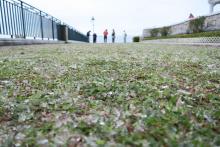20 Dec 1941, Chronology of Events Related to Stanley Civilian Internment Camp
Primary tabs
Tony Banham gives a concise explanation of the military developments that are going to unfold from now until the surrender:
As they remove the defenders from the north-south road, the Japanese, are simultaneously pushing westwards towards Central {then Victoria}, and south towards Stanley.
Stanley Fort, of course, is a major British strong point. Nevertheless, Banham tells us clearly that the main objective was Central/Victoria, capture of which would lead to almost immediate surrender, while 'Stanley was simply a sideshow'. But it's in the southern part of the island that a group are about to undergo what was to become one of the best-known civilian experiences of the Hong Kong fighting.
At 9.30 a.m. the troops and civilians in the Repulse Bay Hotel come under attack. Second Lieutnant P. Grounds (Middlesex) is in command, and his orders are to hold the hotel at all costs, as it guards the coast road. Later in the day Grounds is killed leading an attack to free five prisoners in a garage opposite.
It's a large and varied bunch of civilians who are inside the hotel:
And inside the hotel, too, were a hundred and fifty civilians - young mothers with babies and young children, their husbands fighting with the volunteers, the dowager duchesses of Crown Colony society and Gwen Dew, free-lance American girl photographer from Detroit; the wealthiest Chinese merchants of the Far East and their families; a few Chinese houseboys who had followed their British masters to refuge; eighty-three-year-old Dr. L. C. Arlington, the famous author and authority on Chinese culture; courageous Americans employed by the British-American Tobacco Company who wanted to fight, and retired European rentiers who didn't.
At the other end of the island, Joan Crawford and the survivors of yesterday's siege of the North Point Power station are taken out of the garage in which they've spent the night:
Next day we were lined up once more, the men in uniform separated from the civilians. We were marched down to Ming Yuen to the refugee huts {built for refugees from the Sino-Japanese War}....
Once more we were sorted out, questioned and allocated to huts which were filthy dirty. Some of the bunk beds had been used as lavatories, and we were ordered to clean up as best we could, using our hands and whatever rubbish had been left behind. As we finished, we were ordered out to even flithier huts and the whole process of cleaning again.
Strangely enough, all through the previous two days, having been in the front line so to speak, I had no feeling of fear, as though completely detached from the whole thing. But the cleaning up of this filth finished me off....
We were joined by other civilians, and the mysterious process of organizing life began to stir. Beds were allocated, latrines dug - one for the ladies being modestly screened.
The Daily Mirror's page 1 headline:
Hong Kong Defenders Hold Out - Our Penang Garrison Goes
But the report admits the situation is 'serious' and describes Japanese landings on the north-east of the Island on the night of 17/18. That's a little early, and the report of Japanese successes on the back page is exaggerated:
By 11 a.m. most of the island was in Japanese hands...The remainder of the British withdrew to Victoria Peak while Victoria city was occupied intact by the Japanese.
The whole of Victoria was never to be occupied, but only because surrender came first. The front page of The Daily Express carries a similar story:
Hongkong, fighting to the death with swarms of Japanese who landed yesterday at many points on the island, rejected with scorn a third offer of surrender terms and then came silence.
Citing Japanese sources, the paper claims that British troops had withdrawn to the Peak, where a last stand was expected.
Sources:
Military developments: Tony Banham, Not the Slightest Chance, 2003, 165-166
At 9.30 a.m.: Banham, op. cit., 175.
Civilians: Jan Henrik Marsman, I Escaped From Hong Kong, 1942, 36-37
Crawford: Austin Coates, A Mountain Of Light, 1977, 148-149
Note:
For Bennie Proulx's arrival at the Hotel, see yesterday's entry.

